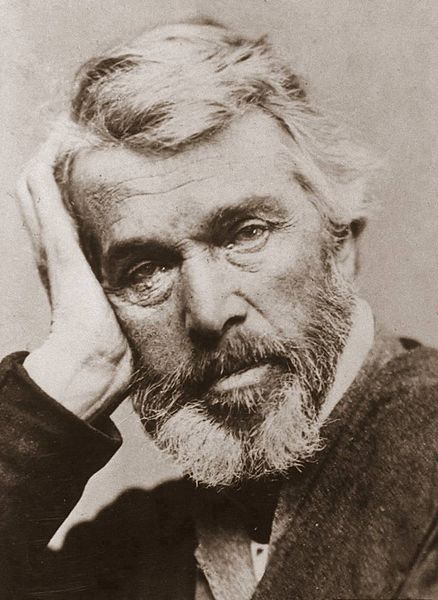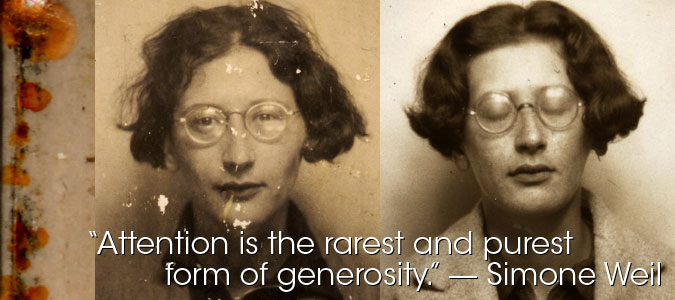Please check out Dawn Arnold’s new Frye Festival blog here.
Bob Marley
httpv://www.youtube.com/watch?v=tzkG6Xu6lUE&feature=fvwrel
A gorgeous live version of “No Woman, No Cry” fom the Legend album. Still gives me chills to hear the audience singing from the opening bar before Bob even gets started.
Today is Bob Marley‘s birthday (1945-1981). His deeply peaceful instincts, inspired by a full commitment to Rastafari, seemed to match his musical genius:
I don’t have prejudice against meself. My father was a white and my mother was black. Them call me half-caste or whatever. Me don’t dip on nobody’s side. Me don’t dip on the black man’s side nor the white man’s side. Me dip on God’s side, the one who create me and cause me to come from black and white.
Frye on peace and choosing life in conversation with David Cayley:
We’ve gone though history thinking of peace as meaning that the war has stopped, and consequently, a lot of people, when you use a word like “peace,” say, “Well, the world of peace sounds awfully dull. There’d be nothing to do if there’s nothing to fight about.” What I go for is “Blake’s I will not cease from mental fight / Till we have built Jerusalem.” God says in Deuteronomy, “I have set before you life and death . . . therefore choose life.” [30:19]. Well, nobody, with all respect to God, could possibly say that that was a logical “therefore.” A lot of people choose life choose it only because they have got into the habit of living. They find it easier to do that than to break clear of it. Others will choose life, but when life becomes an act of choice, then there’s the question of what you’re goint to do with it, what direction you’re to go in. (CW 24, 1001-2)
Video of the Day: Mona Eltahawy
httpv://www.youtube.com/watch?v=Tt7gCj76hQ8
Don’t miss this: HBO may remove it from YouTube before long. Egyptian journalist Mona Eltahawy on Real Time with Bill Maher eloquently takes on the talking-point paranoia about the revolution in Egypt: it’s about freedom and dignity, not stonings and sharia.
Saturday Night at the Movies: “Ulysses”
httpv://www.youtube.com/watch?v=JTEuj4kOCmc
James Joyce’s birthday and the anniversary of the first publication of Ulysses just passed. Here’s the 1967 film adaptation of the novel that was censored, reviled and made undistributable by an X rating; it was not even approved for general release in Ireland until 2000. That lack of wide distribution means that this is an absolutely pristine print, the images as crisp as they were forty years ago — a reminder of how lost is the art of black and white film making.
Frye in “Quest and Cycle in Finnegans Wake”:
An association is implied between Stephen and Icarus, and in some respects Ulysses is a version of the fall of Icarus. Stephen, an intellectual of the type usually described as in the clouds or up in the air, comes back to Dublin and in his contact with Bloom meets a new kind of father, neither his spiritual nor his physical father but Everyman, the man of earth and common humanity, who is yet isolated enough from his society to be an individual too, an Israel as well as an Adam. Stephen approaches this communion with a certain amount of shuddering and distaste, but the descent to the earth is clearly necessary for him. Traditionally, however, the earth is Mother Earth, and what we are left with is a female monologue of a being at once maternal, marital, and meretricious, who enfolds a vast number of lovers, including Bloom and possibly Stephen, and yet is narcist too, in a state of self-absorption which absorbs the lover. (CW 29, 110)
Thomas Carlyle
Thomas Carlyle died on this date in 1881 (born 1795).
Frye in “New Directions from Old” cites Carlyle’s Sartor Resartus in order to make the point that literature does not present “ideas” by way of logic, but a mimesis of ideas by way of metaphor:
Literary criticism finds a good deal of difficulty in dealing with such works as Sartor Resartus takes the structure of German Romantic philosophy and extracts from it a central metaphor in which the phenomenal is to the noumenal world as clothing is to the naked body: something which conceals it, and yet, by enabling it to appear in public, paradoxically reveals it as well.
The “ideas” the poets use, therefore, are not actual propositions, but thought-forms or conceptual myths, usually dealing with images rather than abstractions, and hence normally unified by metaphor, or image phrasing, rather than by logic. (CW 21, 121-13)
TGIF: Black History Month
httpv://www.youtube.com/watch?v=X6n1rnMKlcc
Happy Black History Month from The Second City Network.
Quote of the Day: “Fools should have full liberty to speak”
httpv://www.youtube.com/watch?v=S-x6MP4-ZrA
Glenn Beck yesterday — and tomorrow and tomorrow and tomorrow
Frye in one of the late notebooks:
What is important about free speech in a democracy is not only that everyone has the right to express an opinion, however ill considered, but that fools should have full liberty to speak so that they can be recognized as fools. (CW 3, 410)
“Full mooner” is the term emerging from the mainstream punditocracy to describe the increasingly unhinged Glenn Beck, whose rants are more and more like watching Plan 9 from Outer Space; jaw-droppingly awful but also inadvertantly hilarious. It’s got to be the most licit approximation there is to being high on shrooms.
Patricia Highsmith
httpv://www.youtube.com/watch?v=AxaIV897PkQ
The trailer for Patricia Highsmith’s Ripley’s Game
On this date in 1995 Patricia Highsmith died (born 1921).
From Frye’s 1950 diary:
The thriller is quite a suggestive form actually: it’s the opposite of the detective story, where we get the smug primitive identification with the group & see the individual marked down by a process of hocus-pocus. In the thriller we’re identified rather with the fugitive from society. The archetype of all thrillers is The Pilgrim’s Progress, where the refugee from the city of destruction is hounded on by a nameless fear, & has to do battle with various members of its police force like Apollyon. (CW 8, 343)
Weil and “Attention”
Because it is Simone Weil’s birthday today and events in Egypt are steadily turning from bad to worse, here are some quotes from her to remind us of what we need to remember when it comes to the suffering of others:
The capacity to give one’s attention to a sufferer is a very rare and difficult thing; it is almost a miracle; it is a miracle.
Equality is the public recognition, effectively expressed in institutions and manners, of the principle that an equal degree of attention is due to the needs of all human beings.
Those who are unhappy have no need for anything in this world but people capable of giving them their attention.
(Photo montage via Line Street Productions)
Video of the Day / Quote of the Day
httpv://www.youtube.com/watch?v=PsPBA-bEuEQ
“Pro-Mubarak demonstrators” drive a car at high speed through a group of demonstrators, hitting one of them
Tweet earlier today from Nicholas Kristof of the New York Times:
@ NickKristof : Govt is trying to round up journalists. I worry about what it is they’re planning that they don’t want us to see.


